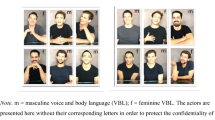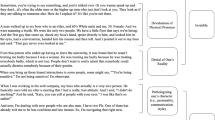Abstract
The present study investigates changes in gender stereotypes by an unobtrusive method. Obituaries of deceased women and men in leading positions as published in four German language newspapers between 1974 and 1998 were analyzed. Following a previous study (E. Kirchler, 1992), terms used in the obituaries to describe former leaders were classified into 58 categories. Frequencies of descriptions were analyzed with regard to leadership success, stability of attributes, and person-orientation versus task-orientation. Results show that gender images were dissimilar in content each of the years. In 1992 and 1998, however, female and male stereotypes became more similar.
Similar content being viewed by others
REFERENCES
Adler, N. (2000). An international perspective on the barriers to the advancement of women managers. Applied Psychology: An International Review, 42, 289-300.
Ashmore, R.D., DelBoca, F. K., & Wohlers, A. J. (1986). Gender stereotypes. In R. D. Ashmore & F. K. DelBoca (Eds.), The social psychology of female-male relations: A critical analysis of central concepts (pp. 69-119). Orlando, FL: Academic Press.
Banaji, M., & Greenwald, A. G. (1995). Implicit gender stereotyping in judgements of fame. Journal of Personality and Social Psychology, 68, 181-198.
Bartol, K. M., & Butterfield, D. A. (1976). Sex effects in evaluating leaders. Journal of Applied Psychology, 67, 446-454.
Bass, B. M. (1990). Bass & Stogdill's handbook of leadership: Theory research and applications (3rd ed.). New York: Free Press.
Blake, R., & Mouton, J. (1964). The managerial grid. Houston, TX: Gulf.
Brody, L. R. (1997). Gender and emotion: Beyond stereotypes. Journal of Social Issues, 53, 369-394.
Burton, C. (1992). Merit and gender: Organizations and the mobilization of masculine bias. In A. J. Mills & P. Tancred (Eds.), Gendering organizational analysis (pp. 185-200). Newbury Park, CA: Sage.
Butterfield, D. A., & Grinell, J. P. (1999). “Re-viewing” gender, leadership, and managerial behavior: Do three decades of research tell us anything? In G. Powell (Ed.), Handbook of gender and work (pp. 223-238). Thousand Oaks, CA: Sage.
Calder, B. J. (1977). An attribution theory of leadership. In B. M. Staw & G. R. Salanik (Eds.), New directions in organizational behavior. Chicago: St. Clair.
Carli, L. L., & Eagly, A. H. (1999). Gender effects on social influence and emergent leadership. In G. Powell (Ed.), Handbook of gender and work (pp. 203-280). Thousand Oaks, CA: Sage.
Cejka, M. A., & Eagly, A. H. (1999). Gender stereotypic images of occupations correspond to the sex segregation of employment. Personality and Social Psychology Bulletin, 4, 413-423.
Davidson, M., & Burke, R. (2000). Women in management: Current research issues. In M. J. Davidson & R. J. Burke (Eds.), Women in management (Vol. 2, pp. 1-7). London: Sage.
Deaux, K. (1984). From individual differences to social categories. Analysis of a decade's research on gender. American Psychologist, 39, 105-116.
Deaux, K. (1993). Gender stereotypes. In F. L. Denmark & M. Paludi (Eds.), Psychology of women (pp. 126-139). London: Greenwood Press.
Diekman, A. B., & Eagly, A. H. (1999). Stereotypes as dynamic constructs: Women and men of the past, present, and future. Personality and Social Psychology Bulletin, 10, 1171-1188.
Eagly, A. H., & Johnson, B. T. (1990). Gender and leadership style: A meta-analysis. Psychological Bulletin, 108, 233-256.
Eagly, A. H., & Karau, S. J. (1991). Gender and the emergence of leaders: A meta-analysis. Journal of Personality and Social Psychology, 60, 685-710.
Eagly, A. H., & Karau, S. J. (in press). Role congruity theory of prejudice toward female leaders. Psychological Review.
Eagly, A. H., Makhijani, M. G., & Klonsky, B. G. (1992). Gender and the evaluation of leaders: A meta-analysis. Psychological Bulletin, 111, 3-22.
Fondas, N. (1997). Feminization unveiled: Management qualities in contemporary writings. Academy of Management Review, 22, 257-282.
Gardinger, M., & Tiggermann, M. (1999). Gender differences in leadership style, job stress and mental health in male-and female-dominated industries. Journal of Occupational and Organizational Psychology, 72, 301-315.
Greenacre, M. (1993). Correspondence analysis in practice. London: Academic Press.
Heilman, M. E., Block, C. J., & Martell, R. F. (1995). Sex stereotypes: Do they influence perceptions of managers? Journal of Social Behavior and Personality, 10, 237-252.
Heller, T. (1982). Women and men as leaders. New York: Praeger.
Kirchler, E. (1992). Adorable woman, expert man: Changing gender images of women and men in management. European Journal of Social Psychology, 22, 363-373.
Kirchler, E. (1997). The unequal equality: Social stereotypes about female and male entrepreneurs. Revue Internationale de Psychologie Sociale, 2, 63-77.
Kirchler, E., Wagner, J., & Buchleitner, S. (1996). Der langsameWechsel auf Führungsetagen-Meinungen überFrauen undMänner alsFührungspersonen. Zeitschrift für Sozialpsychologie, 27, 148-166.
Konrad, A. M., Ritchie, J. E., Jr., Lieb, P.,& Corrigall, E. (2000). Sex differences and similarities in job attribute preferences: A meta analysis. Psychological Bulletin, 126, 593-641.
Laugheed, J. (2000). Attitudes toward women leaders analyzed by gender and occupation (1984-1998). Advancing Women in Leadership Journal, 1, 1-6.
Lord, R. G. (1985). An informational processing approach to social perception, leadership perceptions and behavioral measurement in organizational settings. In L. L. Cummings & B. Staw (Eds.), Research in organizational behavior (pp. 87-128). Greenwich, CT: JAI Press.
Martinko, M. J., & Gardner, W. L. (1987). The leader/member attribution process. Academy of Management Review, 12, 235-249.
Mitchell, T. R. (1995). Führungstheorien-Attributionstheorie. In A. Kieser, G. Reber, & R. Wunderer (Eds.), Handwörterbuch der Führung 2 (pp. 847-861). Stuttgart: Poeschel.
Nieva, V. F., & Gutek, B. A. (1980). Sex effects on evaluation. Academy of Management Review, 5, 267-276.
Pfeffer, J. (1992). Managing with power. Boston: Harvard Business School Press.
Powell, G. N., & Butterfield, D. A. (1989). The “good manager”: Did androgyny fare better in the 1980s? Group and Organization Studies, 14, 395-403.
Rimm, S. (1998). The cultural underachievement of females. In G. Davis & S. Rimm (Eds.), Education of the gifted (pp. 308-341). Boston, MA: Allyn & Bacon.
Robbins, S. (1998). Organizational behavior (8th ed.). Englewood Cliffs, NJ: Prentice Hall.
Rudman, L. A., & Glick, P. (2001). Prescriptive gender stereotypes and backlash toward agentic women. Journal of Social Issues, 57, 743-762.
Schein, V. (2001). A global look at psychological barriers to women's progress in management. Journal of Social Issues, 57, 675-688.
Vinkenburg, C. J., Jansen, P. G. W., & Koopman, P. L. (2000). Differences in managerial behaviour and effectiveness. In M. J. Davidson & R. J. Burke (Eds.), Women in management (pp. 120-137). London: Sage.
Weiner, B. (1986). An attributional theory of motivation and emotion. New York: Springer.
Weinert, A. B. (1998). Organisationspsychologie (4th ed.). Weinheim: Psychologie Verlags Union.
Author information
Authors and Affiliations
Corresponding author
Rights and permissions
About this article
Cite this article
Rodler, C., Kirchler, E. & Hölzl, E. Gender Stereotypes of Leaders: An Analysis of the Contents of Obituaries from 1974 to 1998. Sex Roles 45, 827–843 (2001). https://doi.org/10.1023/A:1015644520770
Issue Date:
DOI: https://doi.org/10.1023/A:1015644520770




